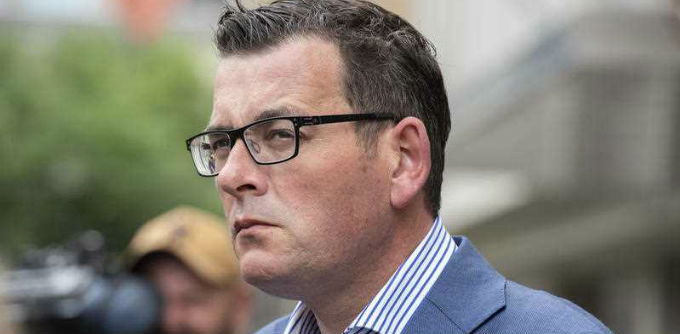
Victorian Premier Daniel Andrews. Source: AAP/Ellen Smith.
Some Melbourne business owners have spent hours on the phone to the Victorian government as a cloud of uncertainty descends across the city amid the imposition of stage four COVID-19 restrictions today.
From midnight last night, the vast majority of businesses across the state have been ordered to shutter their shops and restrict their supply chains under tough new rules designed to curb the second wave of coronavirus infections in Victoria.
But the mesh of storefronts and complex supply chain operations that make up Melbourne’s small business sector have been thrown into chaos by the move, detailed on Monday, leaving business owners only two days to determine what the new rules mean for them.
The Victorian government released an updated list of permitted businesses last night in an attempt to quell concern, and the Victorian Chamber of Commerce and Industry chief executive Paul Guerra, who has been in discussion with officials in recent days, says further guidelines for manufacturers forced to reduce their operations will be released today.
“It’s been difficult for all businesses to understand whether they would be impacted,” Guerra tells SmartCompany.
“The rules published today are pretty clear if I’m fair; that doesn’t mean people are going to like them.”
The owners of Pinky’s store in North Melbourne took to Instagram yesterday to express their frustration with “vague” guidance about how the rules would impact their local delivery operation, spending three hours on the phone to Business Victoria before being told they would have to scale back their business.
“This is pretty disappointing as we have really enjoyed dropping off your goodies and all our local customers have been the BIGGEST supporters of Pinky’s. But the rules are far too vague and we just can’t risk getting a fine,” the business said.
The media is awash with reports of late-night phone hookups between prominent business lobbyists and government officials at the state and federal level last night, as big businesses continue to lobby authorities to ease up or at least provide additional clarity about the restrictions.
In particular, business lobbyists are in an uproar about rules forcing many manufacturers to operate at a 33% reduction to peak capacity, while others, including textile, clothing and furniture makers, have been forced to close altogether.
Wholesale traders, excluding those related to food and medical supplies, have also been forced to close from today, raising further concerns that the retail sector, now able to operate online-only, will suffer stock shortages.
The rules were less clear for distribution centres and other warehouses supporting retail and general goods operations, with fact sheets circulated by the Victorian government seemingly failing to specify what the rules would be for these businesses.
The unprecedented restrictions underscore the interconnected nature of modern supply chains, with the prospect of shutdowns in Victoria slated to affect businesses in other states, as pain cascades from key manufacturing businesses supplying wholesale traders across the city.
Sandy Chong, chief executive of the Australian Hairdressers Association, says salons across the country are likely to miss out on crucial deliveries of goods while Melbourne distribution centres deal with stage four.
“Much of the country, regardless of what state you are in, actually get a lot of our goods from Melbourne,” Chong tells SmartCompany.
“There’s thousands of salons Australia-wide that rely on deliveries from Melbourne, and I can’t get a definitive answer from the Victorian government as to whether these suppliers can open.”
Guerra says its too early to say what effect the new rules will have on business supply chains.
“As soon as you reduce staff there will be impacts,” he says.
“But will it be significant? We have to let it play out and see.”
While business lobbyists urged the Victorian government to delay the onset of the stage four rules, Premier Daniel Andrews stood firm yesterday, saying there were invariably going to be questions and complexities whenever a white list was drawn up.
Australian Industry Group chief executive Innes Willox told the ABC on Thursday morning that white list-style arrangements, where the government outlines which businesses can open, are inherently unworkable.
“The conundrum here for business is there’s been very little clarity around who could and couldn’t open,” he said.
“Businesses today face getting a visit from the police to explain why they are operating.”
NOW READ: Retail stores to close and construction curtailed in Melbourne’s stage four restrictions


COMMENTS
SmartCompany is committed to hosting lively discussions. Help us keep the conversation useful, interesting and welcoming. We aim to publish comments quickly in the interest of promoting robust conversation, but we’re a small team and we deploy filters to protect against legal risk. Occasionally your comment may be held up while it is being reviewed, but we’re working as fast as we can to keep the conversation rolling.
The SmartCompany comment section is members-only content. Please subscribe to leave a comment.
The SmartCompany comment section is members-only content. Please login to leave a comment.